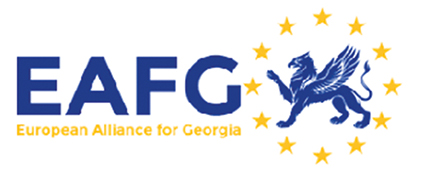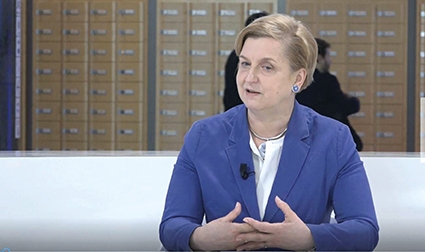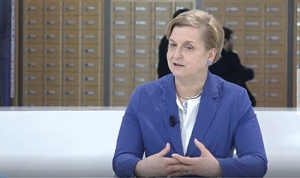MEP Fotyga on those For & Against the EP Resolution
Exclusive interview
Last week the European Parliament, with an overwhelming majority, adopted the Resolution on Georgian Occupied Territories 10 years after the Russian invasion. Polish MEP Anna Fotyga was one the chief architects behind the resolution and it was largely due to her staunch and uncompromising stance that the resolution ended up with such an outspoken title. To discuss further the benefits and leverages that the EP resolution yields to Georgia and Georgians, we sat down with MEP Fotyga for yet another episode of our “Messages from Brussels” series.
The resolution itself was adopted with a rather large majority, but from private talks with your colleagues, it seemed there were some complications regarding the Resolution
Well, the end result is very positive; we succeeded in gaining a very comfortable majority for the Resolution. But yes, there was an attempt to undermine the process- at the very beginning of the session there were requests to change the title, requests that actually questioned the role of the sides involved in the conflict. But this resolution clearly indicates who was the aggressor and who was the victim and also that the territories of South Ossetia and Abkhazia are still occupied territories of Georgia.
Which political groups are we talking about? Because that's important for strategic communication purposes for Georgia; maybe we have more work to do to convince these people?
The whole motion came from the extreme left. When you look at the voting panorama in the EP, you might frequently witness this strange alliance between extreme right and extreme left, but in this case the endeavor came from the extreme left;
The question that Euro-skeptics have been asking in Georgia about this resolution is what practical use it has
First of all, it’s an official document of the European Union; it was voted on during a plenary session of the Parliament and it expresses the view of the majority of the elected members, representing citizens of the European Union, of a variety of member states. It was a clear majority, the broad acceptance of five major political groups in the Parliament. From this point of view, it was a real success that so many MEPs accepted the statements. The debate was also something extremely important because members were very outspoken, very clear in their views; actually it was pressure exerted from the Parliament on other institutions, on the Commission, on the High Representative, to use clear language to clearly support Georgia; that's extremely important in terms of Georgia's Euro-Atlantic aspirations. I see it as very strong support, proof, testimony from important EU politicians. In the Parliament we have former prime ministers, former ministers; people who are very experienced in international law, international policy relations, and there was very clear support for Georgia.
The Resolution also mentions the EU-mediated ceasefire agreement between Russia and Georgia, which remains unfulfilled. I think we can safely assume that Russia will shrug off this resolution, but do you see any realistic way of making Russia follow up on its obligations?
I’ve been in international politics for a really long time and I have seen moments when such statements were not so obvious. Yet I have seen first and foremost a change in the attitudes of the international community of the West. It is becoming obvious for the whole transatlantic community that by defending Georgia, we defend our values.
How much is that the consensus of today’s EP?
There's quite a broad consensus on this. While this resolution is not a legislative act, not a legal norm that enables us to execute things immediately, it’s certainly a step moving things in the right direction, and believe me, such changes of mental attitudes are extremely important; it may be that in the not-so-distant future, Russia feels real pressure from the outside. On such occasions as the tenth anniversary of the aggression on Georgia, the fourth anniversary of the annexation of Crimea, we have to keep repeating the messages in order for Central and Eastern Europe, the South Caucasus and the Balkan states to remain on the table of international debates, not to be treated as a ‘side argument,’ somehow lost in the big game or bargained as a footnote.
While the Resolution mentions human rights violations on the administrative boundary line, there is no mention of specific cases (eg. Georgian citizens Tatunashvili and Otkhozoria). In neither case was justice served nor the killers punished. The Georgian gov’t is adopting a sanctions list against those involved in such acts - could we expect EU countries to follow suit?
I'm aware of this. Actually, in my statement in debate, in many statements in debate, in fact, support for the “Otkhozoria-Tatunashvili List” was very much clear and very visible; we intend to keep this pressure up through the institutions, through our respective member states. I do not exert pressure on my own government but believe me, my government monitors my activities.
Two weeks ago, the breakaway regions of Georgia were recognized by Assad. Last year, the US adopted a bill which prohibits state aid to countries which recognize these territories; is it time perhaps for EU to do likewise?
The political equilibrium within the EU needs to be assessed but this tends to change if individuals exert enough pressure. Those clearly aware of the activities of Russia, perhaps not so many, around 70 of us here in the Parliament, use all opportunities to bring such topics to debate.
As for Syria’s decision, I think it was good because I always prefer clear situations and here it was obvious that the regime was very much supported by Russia and Putin.
Regarding the late President Kaczynsky now. You were a close associate of his. After eight years and after the Polish reinvestigation in 2018, what's the final public consensus in Polish society? What really happened in Smolensk?
Public opinion is divided. Things are not clear, of course; many mistakes were made at the early stage of investigation; there was not enough international support. It's extremely difficult but we are absolutely dedicated and sooner or later, I am sure that we will have clearer picture.
Personally, I consider this case as a certain stage in a whole series of events happening in our region; it was President Kaczynsky warning the international community about the policies of Russian neo imperialism, their desire to impose influence on our part of the world to regain the influence of the former Soviet Union under a different flag, and I'm still of this same opinion in assessment of Russia's policies. My private opinion is that President Kaczynsky was the victim of the general situation. I'm not sure what the real trigger of this was, but surely he was alienated in his views; he was alienated and that diminished his chances, weakening his personal security.

This material was prepared in the scope of the “Messages from Brussels” series, a project of the European Alliance for Georgia, a Brussels-based NGO aiming to bring more Georgia into Europe.
By Vazha Tavberidze












